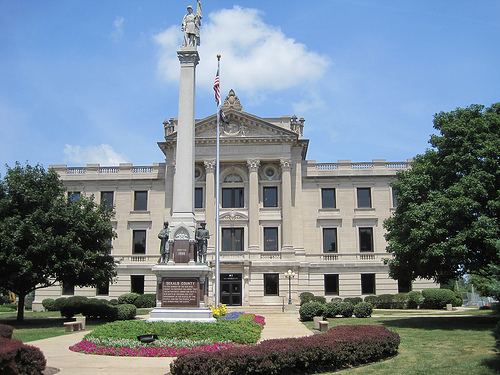What’s the point of one-cent parking?
The city of Sycamore – about an hour west of Chicago – charges exactly one penny for 12 minutes of parking. An hour costs a nickel; two hours cost a dime. Parking fines are a whopping $1.00. What’s unusual here is that the city bothers to collect anything at all – if it’s making less money off the meters than it costs to maintain them, especially true because the meters are uncommon and need special equipment and expertise to fix – really, what’s the point?

The lovely DeKalb County Courthouse, in equally lovely Sycamore, Illinois. Image from Teemu008.
As is the case with a lot of apparently questionable decisions: marketing. The articles about Sycamore’s parking management highlight the goodwill and public interest generated by the tiny fees. Let’s take a look at the claims made on behalf of parking meters that charge less than they cost:
- They harken back to a time when parking was not perceived as a revenue generation tool, and the meters “encourage people to come downtown.”
According to the Journal Gazette, Sycamore’s city manager thinks that the revenues gained from charging more would eventually mean less business for Sycamore’s downtown. The city manager’s proposition is testable, but as far as we can tell, hasn’t been tested. We do know with some certainty that “people who use active transportation modes to reach commercial areas shop there more often, and frequent more shops per trip,” as NACTO puts it. The study suggesting this took place in Bristol, and just as a cat is not a dog, an Englishman is not an American. It is possible, though, that structuring local planning decisions around car access loses the city money.
Besides that, $0.01 wasn’t always the barely-worth-considering sum that it is today. It’s possible that generating revenue a penny at a time valued the land appropriately at some point in the past.
- Ultra-low parking prices function as marketing tools on social media.
As marketers, we’re always looking for ways to get people to come to our e-commerce sites – and more importantly, to come back. We’re skeptical about this claim, though. Does the antiques store that cited this strategy have to remind people regularly that parking in their town is virtually free?
We don’t know how many tourists Sycamore gets, but how likely is it that a potential customer (a) has already liked a shop in downtown Sycamore in order to be susceptible to a marketing push; and (b) would be dissuaded from making a purchase by the $0.50 that it might take to park in a more conventional parking environment?
For tourists, Sycamore’s parking prices mark a windfall, but not one that they’re likely to know about until they’ve already parked. Locals, on the other hand, don’t often pick up and move due to parking prices that are much higher.
We just don’t see how a $0.01 parking fee helps, marketing-wise.
- Relax, buddy! This isn’t Chicago!
Bringing up Chicago in any discussion of parking management is like talking about politics and calling the first person who disagrees with you a Nazi.
- A lot of other small cities have miserable downtowns, but Sycamore doesn’t. It must be the parking prices.
This is a classic logical fallacy, immortalized in the West Wing episode Post Hoc, Ergo Propter Hoc.
Sycamore’s downtown might be flourishing, but why isn’t that because of excellent management elsewhere, or smart businesspeople, or favorable demographics?
Besides, if the land used for parking were used for commercial real estate instead (more floor space for existing businesses, or infill allowing for new ones), wouldn’t that grow the pie, too? Providing this money-losing service at all might mean Sycamore is missing out on rents, taxes, and jobs.
- Intangibles. Paying a penny for anything is kinda sweet!
You have us here, but that doesn’t mean it makes economic sense.
Unfortunately, testing the opposite end of these many defenses of heavily subsidized parking usually means making changes that are hard to reverse.
As this article concludes, when the pieces needed to fix the meters are finally no more, the city will probably be forced to charge something more closely resembling market rates. When that happens, we hope no one leaves town in disgust, but we doubt they will.
Related Posts
Category: Parking Tech

















